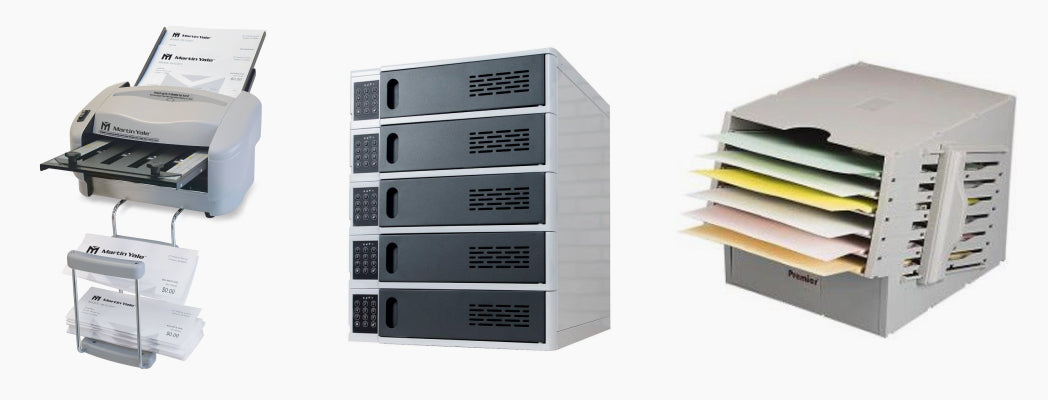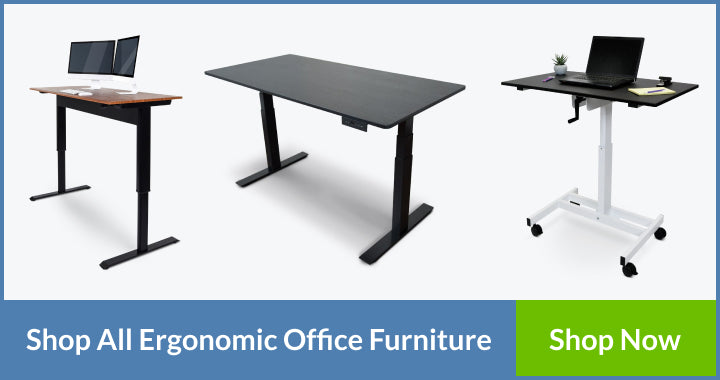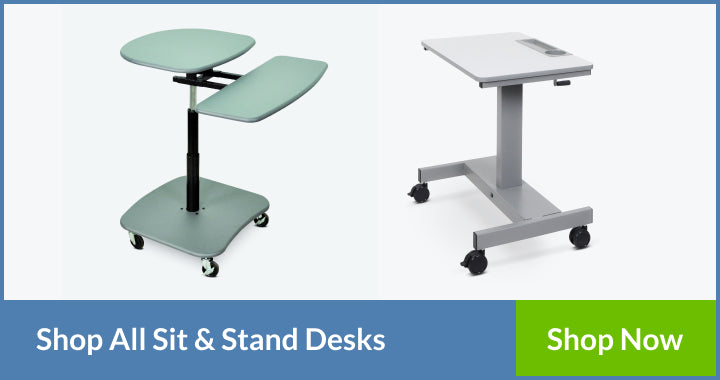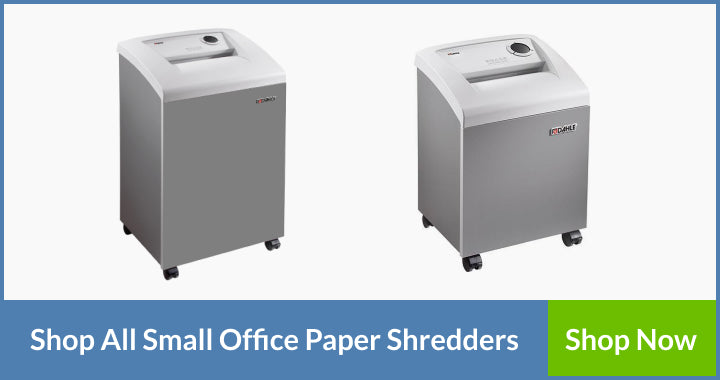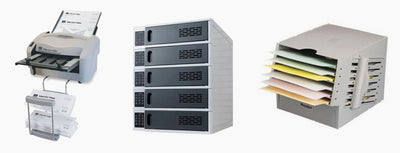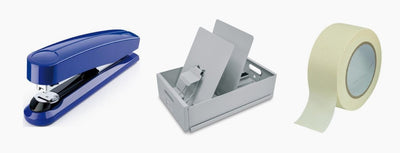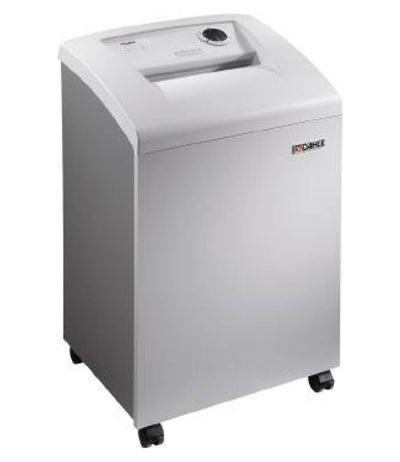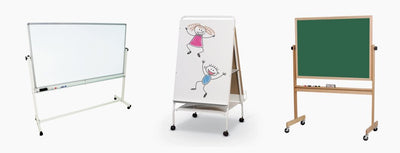Productivity in any workplace largely depends on the employees themselves. The output that employees produce correlates with the time and effort they put in their work.
While there are various factors influencing the productivity of employees, employers often overlook one key aspect of an ideal work environment: office essentials. Physical items might seem like a trivial factor of workplace efficiency, but at the end of the day, they have a significant impact on the output that employees can yield.
- I. Advantages of Complete Office Essentials
-
II. List of Office Essentials
- 1. Desk
- 2. Chair
- 3. Work Lighting
- 4. File Organizer
- 5. Safe
- 6. Whiteboard
- 7. Paper Shredder
- 8. Printer, Scanner, Fax Machine, and Photocopier
- 9. Office Supplies
- 10. Computer Hardware, Software, and IT Furniture
- 11. Communication Lines and High-Speed Internet Connection
- III. Choosing the Right Office Essentials
Advantages of Complete Office Essentials
In an office fully equipped with the necessary items, employees can get more tasks done. Lack of supplies and equipment can, in fact, stand in the way of productivity. As with most trades, the right tools can help workers do the tasks at hand.
For instance, without pens, papers, or note-taking devices, employees cannot jot down the minutes of meetings. Forgotten notes or messages can result in wasted time and effort or even errors.
Another example is the absence of folders and file cabinets, which can result in the employees’ inability to organize their paperwork. Lack of arrangement in paperwork can lead to employees putting a huge amount of time and effort into looking for important documents. It might also result in the loss of sensitive information.
With complete equipment and supplies, however, companies can prevent the loss of overall productivity.
Apart from this, another advantage of having a complete set of office items is the comfort of employees. Since employees spend the greater part of their days in the office, comfortable workstations can go a long way.
Poorly designed chairs and desks can lead to repetitive strain injuries, which can be a cause for absenteeism. Ergonomic furniture, on the other hand, can make employees feel more at ease with accomplishing their tasks. A complete set of comfortable furniture can thus maximize productivity as it can motivate employees to go to work and do their jobs efficiently.
Lastly, furniture, equipment, and supplies can also impact the appearance of a company to clients. A poorly stocked office might appear as if the business isn’t thriving at all. First impressions do matter, especially in businesses. For the sake of securing customer relationships, among other reasons, companies should invest in complete office items.
List of Office Essentials
There are a variety of factors to consider in choosing the right items for the office. Budget and space, for example, are some of the things that companies should look into before shopping for office items. However, choosing office essentials all boils down to the needs of the company.
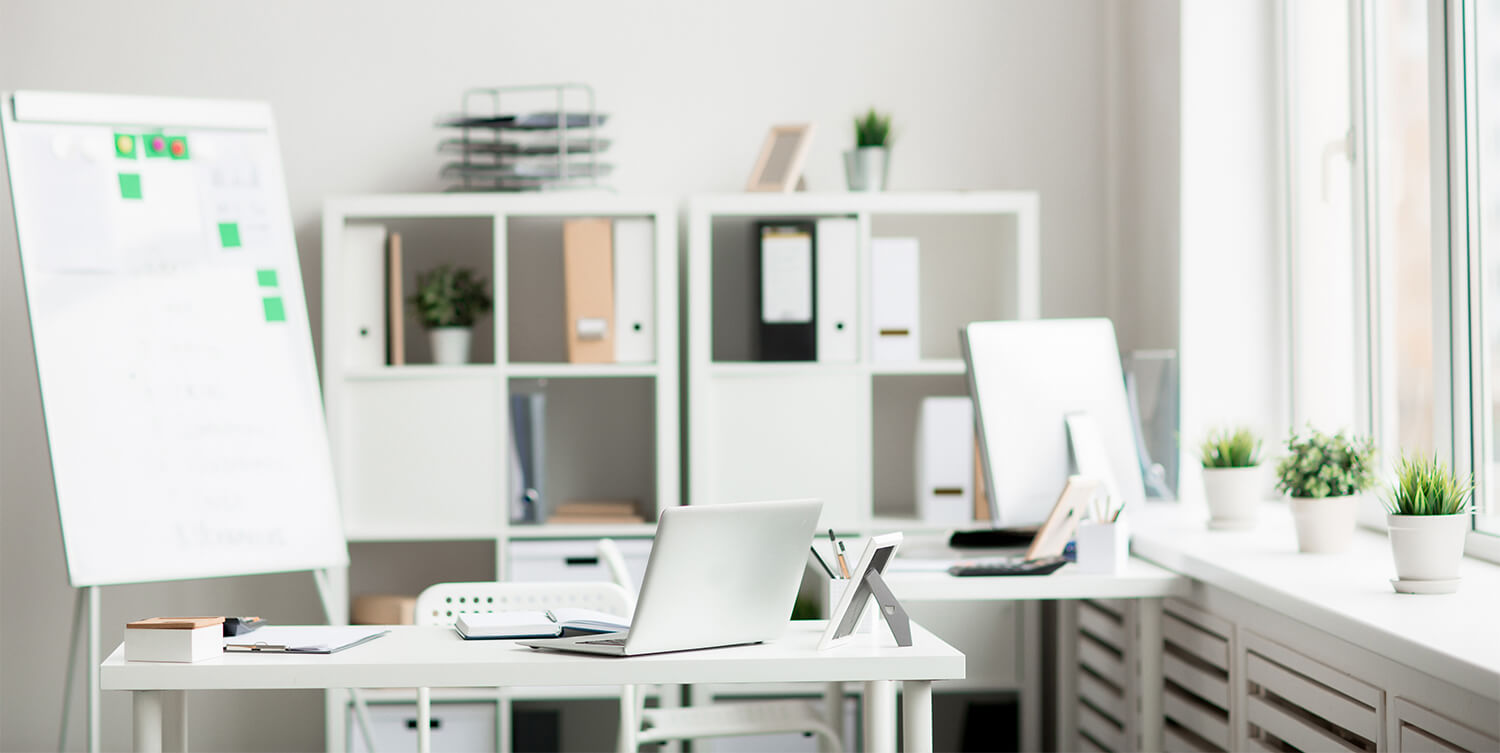
The needs of businesses vary from one industry to another, so supplies and equipment also vary among different offices.
In spite of this, there are some items that are consistently present in many offices. These items are indispensable to get most businesses up and running.
If you’re setting up a new office or simply planning to re-stock your existing office, use this checklist to determine what your workplace might need.
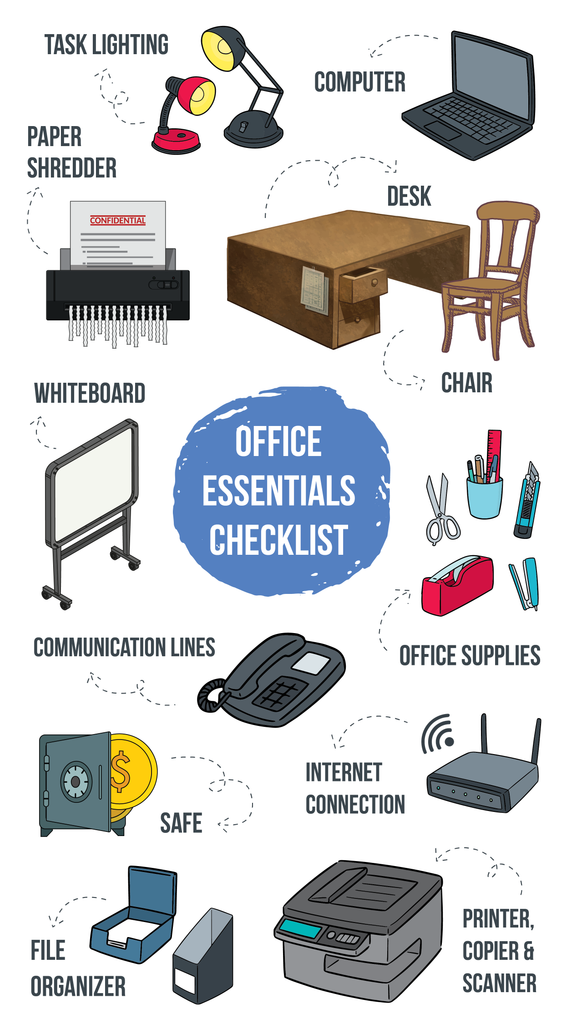
1. Desk

A workstation will not be complete without a work surface or a desk. Some people might view it as some sort of status symbol, while others might see it as a mere surface for placing their things. No matter how people perceive a desk, it’s where office employees spend most of their waking hours. That said, employers should not just purchase desks because they’re on sale or because other offices use the same desk model. Office desks should be evaluated based on how they can contribute to the comfort of employees.
Office desks come in various styles, but some of the crucial factors in choosing the right desk are its size and construction. Investing in sturdy office desks with sufficient work surface and storage space can be a money-saving decision for the company in the long run. With these desks, there won’t be any need for companies to replace old, broken ones in the future. Moreover, these kinds of desks eliminate the need to purchase more desks as the demand for work surfaces increases.
Another key factor to consider when picking out an office desk is its ergonomics. Using ergonomically designed desks can prevent employees from suffering backaches and other body pains caused by poor posture. For the utmost comfort, it’s best to invest in height-adjustable desks or sit/stand desks. Another option is to turn existing desks into standing ones using standing desk converters. With these desks, employees can work while sitting or standing, which can benefit their well-being in the long run.
2. Chair
Apart from desks, another thing that completes a workstation is a chair. Like desks, office chairs come in various styles. Choosing from a wide range of office chairs can get overwhelming. However, selecting the right one is worth the time and effort as office chairs can affect the health and comfort of employees. While it’s natural to take aesthetics into consideration, chairs should first and foremost be ergonomically designed. These pieces of furniture should be comfortable enough for employees to sit on. Most importantly, they should have a height that provides employees with ample legroom. Just like office desks, it’s more convenient to have height-adjustable office chairs than using chairs with fixed heights.
Office chairs need to have comfortable upholstery to prevent employees from developing back problems and other repetitive strain injuries. Unless the office makes use of sit/stand desks, employees spend the whole day sitting on their chairs, which can serve as a health risk. Because of this, chairs should at least be designed to allow employees to maintain proper posture.
3. Work Lighting
Proper ergonomics in the office does not only mean furniture design, but it also refers to lighting levels. Poor lighting can cause eye strain and headaches from frequent squinting, and it might even lead to errors in tasks. That’s why workplaces need to have adequate lighting, especially in areas where detail-oriented tasks often take place. This way, employees won’t have to squint whenever they need to focus their eyes on the task at hand.
It’s also worth noting that the light intensity of computer screens and ambient lighting should be at the same level. Excessive contrast between light and dark areas can cause eye fatigue and other vision problems. With proper lighting, however, employees can view their work comfortably.
4. File Organizer
An organized filing system is one of the key elements of efficient workplaces. When the office doesn’t have any filing system, chances are employees will spend their precious time rummaging through piles of documents. Moreover, companies might even lose documents containing sensitive information.
While many businesses have been gearing their operations toward becoming paperless, printing documents is still necessary for most industries. That’s why a file organizer or document storage is essential in any office. With a file organizer, employees can have an easy time sorting documents and finding the right files whenever they need to. Most file organizers also feature labeling systems so that users can arrange their files in a certain order.
5. Safe
More often than not, businesses are the primary targets of thieves. Companies have a lot of valuable assets, from cash to sensitive data. Because of this, office safes are absolutely worth the investment. Quality safes are usually fire- and burglar-resistant. Investing in one can thus provide money, documents, and other valuables with protection against fire and theft. While security personnel and cameras can keep a workplace safe, these things can’t afford to give valuables the kind of protection that safes are designed to provide.
6. Whiteboard
There’s something about a blank whiteboard that makes it tempting for people to write new ideas and share them with others. That said, whiteboards in offices can encourage collaboration among employees. This fact rings especially true during meetings. Since meetings are generally meant for brainstorming, a whiteboard in the room can serve as a sounding board for ideas. Employees can see shared thoughts, fully digest them, and deliberate the pros and cons of these ideas among themselves.
Aside from this, whiteboards can also function as bulletin boards on which reminders and to-do lists can be posted. Some whiteboards are even designed with monthly calendars so that people can plan, organize, and assign tasks ahead of time.
7. Paper Shredder
Data security does not only mean keeping important documents under lock and key; it also means destroying these documents. When confidential information falls into the wrong hands, it might cause businesses to lose clients, and it might even lead to legal disputes. Because of this, companies should have a machine that effectively destroys documents: a paper shredder. Shredders nowadays are designed to turn documents into cross-cut, confetti-like pieces. That means it will be entirely impossible for other people to reassemble shredded documents. While shredders are far different from safes, they nonetheless offer an effective way to secure or, in this case, destroy important documents in any office.
8. Printer, Scanner, Fax Machine, and Photocopier
Nowadays, the use of paper for communication and information has become obsolete. However, there are some situations wherein using paper cannot be avoided. Some clients might still opt to communicate through fax machines rather than email. Others might strictly require hard copies of documents, such as blueprints and legal documents. No matter what the reason might be, it is still vital for offices to own printers, scanners, fax machines, and photocopiers. Some printers are designed to be multipurpose, which means they have the functions of all the said machines. Of course, when using printers, it’s best to always stock up on printer supplies, especially if your office frequently prints documents.
9. General Office Supplies
Despite the fact that most modern businesses run on information technology (IT), some situations call for the old-fashioned way of jotting notes down and sending messages with the use of traditional office supplies. These supplies, such as staplers, markers, sharpeners, and printer paper, are relatively inexpensive, so you won’t have a problem keeping a stock of these items. Even if you don’t think your workplace will be needing these supplies, it’s always a good idea to stock up on them. That way, you won’t have to run back and forth to the store every time your office supplies run out.
10. Computer Hardware, Software, and IT Furniture
In this day and age, going digital is a must for businesses. Without technology, companies of today will not be able to operate properly. Depending on the needs of your business, it’s essential to have basic computer hardware, such as central processing units (CPUs), monitors, keyboards, mouse, servers, and flash drives. However, there’s no need to make unnecessary purchases of computer components if your employees won’t be using them.
When purchasing basic computer hardware, commonly used software programs typically come installed. Most offices only require word processing, email management, and spreadsheet programs. Some companies, however, have to access additional software programs for their business needs. Choosing software programs and hardware all boils down to the needs of running your business.
Using computer hardware calls for the right IT furniture. The kind of IT furniture that your office needs depends on the kind of hardware that you have. For instance, if your business operations rely on servers, the office should have server cabinets or racks to keep expensive servers safe and secure. If your office only requires printers and computers, spacious desks might already be sufficient. Audiovisual (AV) carts can also be convenient pieces of office furniture. These carts can safely store and transport moderate-sized computer components, like small printers and AV equipment.
11. Communication Lines and High-Speed Internet Connection
Communication and information are some of the ingredients for a successful business. However, offices won’t have these two factors without communication lines and internet access. While most people correspond through emails and other online messaging services, phone lines—be they traditional telephones or GSM services—are still necessary for business communication.
High-speed internet access is also indispensable in today’s businesses. Exchange and retrieval of information can be done instantly with a fast internet connection. Moreover, some software programs rely on an internet connection for them to run. No matter what type of business you run, its success most likely depends on fast, reliable broadband.
Choosing the Right Office Essentials
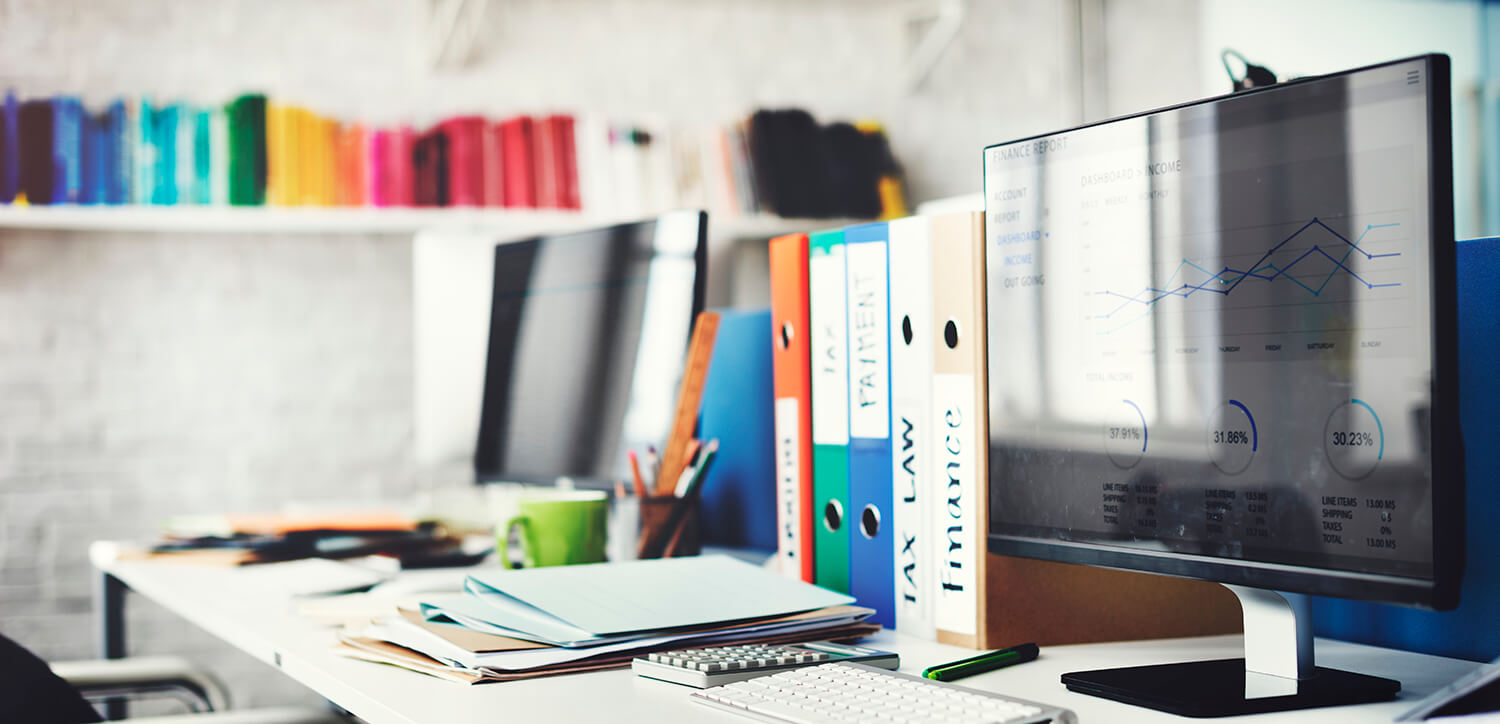
Today’s world generally depends on IT. Nevertheless, getting the right supplies, furniture, and equipment continues to be necessary for most modern offices. Comfort and efficiency are just a couple of the advantages of having a fully-stocked office. However, before any company experiences these benefits, employers need to carefully select the right items that their offices need.
In order to choose the right office items, it’s important to list down the needs of the employees and the company as well. That way, employers can avoid purchasing unnecessary items, and they can ensure that the things they’re buying will serve their purpose.
Naturally, the budget is an unavoidable factor that anyone must consider in any buying decision. This is particularly true for small business owners and entrepreneurs who have just started a new business venture. When it comes to buying office furniture, equipment, and supplies, employers should start with the priorities of the company. They can always buy more as their businesses grow.
When purchasing office essentials, another aspect to consider is the office space. It won’t be practical, for instance, to order huge couches and desks if they cannot fit in the limited office space. Making the most of the available office space also means selecting only the items that are absolutely necessary for a company to run.
Lastly, investing in office essentials entails choosing products of the best quality. It’s more expensive to buy cheap yet easily breakable items than to invest in reasonably priced and long-lasting products. That’s why it’s always a good idea to look to products of well-established brands, like those included in Engineer Warehouse’s offerings. Seeing how important office essentials are in businesses, we have carefully selected office equipment, supplies, and furniture of leading brands in the market. Long-lasting, durable, and well-designed, these products are definitely the best deals on office items you’ll ever find online.






